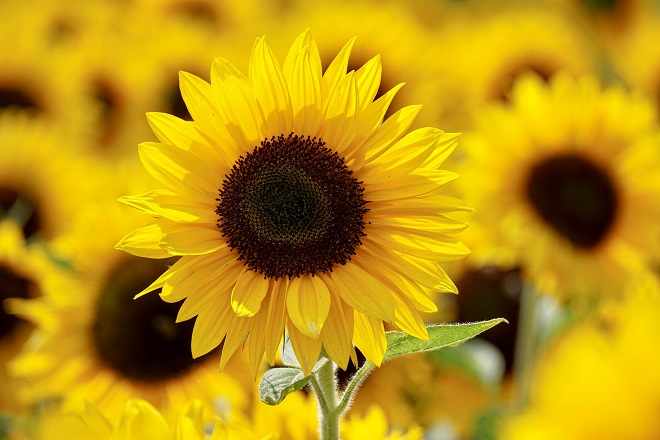Flowers in the office might look amazing but be careful, it can be cause allergies and migraines.
The smell of fresh flowers can put a smile on almost anyone’s face. If you want to add some warmth to your workspace, perhaps bringing in some flowers will do the trick. Indoor flowers don’t just liven up your workspace, they also improve your mood and boost your productivity. The best part is that they are low maintenance, giving you a lovely economic alternative to other office art and accessories.
Unfortunately, if you have allergies, some indoor flower varieties might be a problem. Choosing allergy-friendly flowers can make the difference between enjoying a healthy workspace and sneezing all day. Luckily, you don’t have to turn to rare, expensive flowers to enjoy them in your office. There are plenty of low-pollen and migraine-free flowers available at affordable rates on the market today.
Symptoms of flower Allergies
A majority of indoor flowers send pollen particles into the air. These pollen particles cause serious allergic reactions when inhaled by people with allergies. The bulk of the flowers that cause allergies either have high pollen quantities or strong smells. Some common allergy symptoms to look out for are: watery eyes, a runny nose and sneezing. Depending on the person’s allergies, some also experience coughing, eye swelling and headaches.
Fortunately, there are various over-the-counter medications to counteract the effects of an allergy. If you experience any of these symptoms, be sure to consult a medical professional first before buying any drug. Despite their availability, prevention is always better than cure. Avoiding common allergens will save you time and money that you’d otherwise spend getting treated.
5 flowers that cause allergies
With that said, here are the top five flowers that might cause allergies and migraines in the office.
English Lavender
At the top of the list is the English Lavender. Many people have allergic reactions to both the flower’s pollen and odor. Lavender blooms in clusters, and, given that their pollen is dispersed by wind, they can cause serious nasal allergies to anyone in close contact with them. Their strong smell is known to cause migraines for some people as well. The flower can also cause dermatitis reactions upon contact for some people with sensitive skin, so it’s best to avoid it.
Baby’s Breath
These white and pink flowers are common in cottages and many florist bouquet arrangements. Despite their small size, baby’s breath flowers have a huge amount of pollen. Within a closed office environment, any small breeze will blow it into the air and wreak havoc on people with allergies. Even though the double-flowered variety has significantly less pollen, it’s advisable to avoid them completely in an office setting.
Hybrid Tea Roses
The pollen particles in most roses are too big to travel through the air, making them allergen-free and, therefore, the perfect addition to your office desk. However, the hybrid tea variety has an intense fragrance that may cause migraines for those sensitive to smells. Dealing with migraines at work is uncomfortable and affects your productivity, so it’s in your best interests to avoid this species. Other common culprits include the Floribunda, English, and Bourbon rose varieties.
Chrysanthemums
Chrysanthemums are hardy flower plants that come in various colours ranging from purple and pink to off-white. They are popular container plants and may find their way into your office space, given their wide popularity. Unfortunately, these plants have allergy-inducing pollen, which may be counterproductive to people with allergies. Chrysanthemums have a strong resemblance to allergy-inducing Asters, which should also be avoided.
Sunflowers

To be fair, sunflowers can liven up any office interior with their bright yellow radiance. However, the huge size of the flower’s centre disk serves as an indication of the sheer amount of pollen it can produce. Coupled with the fact that the pollen can be dispersed by wind, having these flowers in your office can spell doom for anyone with allergies. Luckily, some pollen-free sunflower varieties do exist, such as the Apricot Twist.
Keep Your Office Space Allergy-Friendly
Selecting the right flowers and plants to keep within your workspace is just the first step in creating an allergen-free workstation. Without proper maintenance, virtually any indoor plant can make your allergies worse. For instance, dust is a common allergen, and neglected plants are a huge dust magnet.
Just because many indoor plants and flowers don’t require excessive maintenance doesn’t mean that they should be neglected. Every once in a while, water them and wipe off any dust from the leaves and petals. By doing this, you can enjoy the positive benefits of having more greenery in your office.






